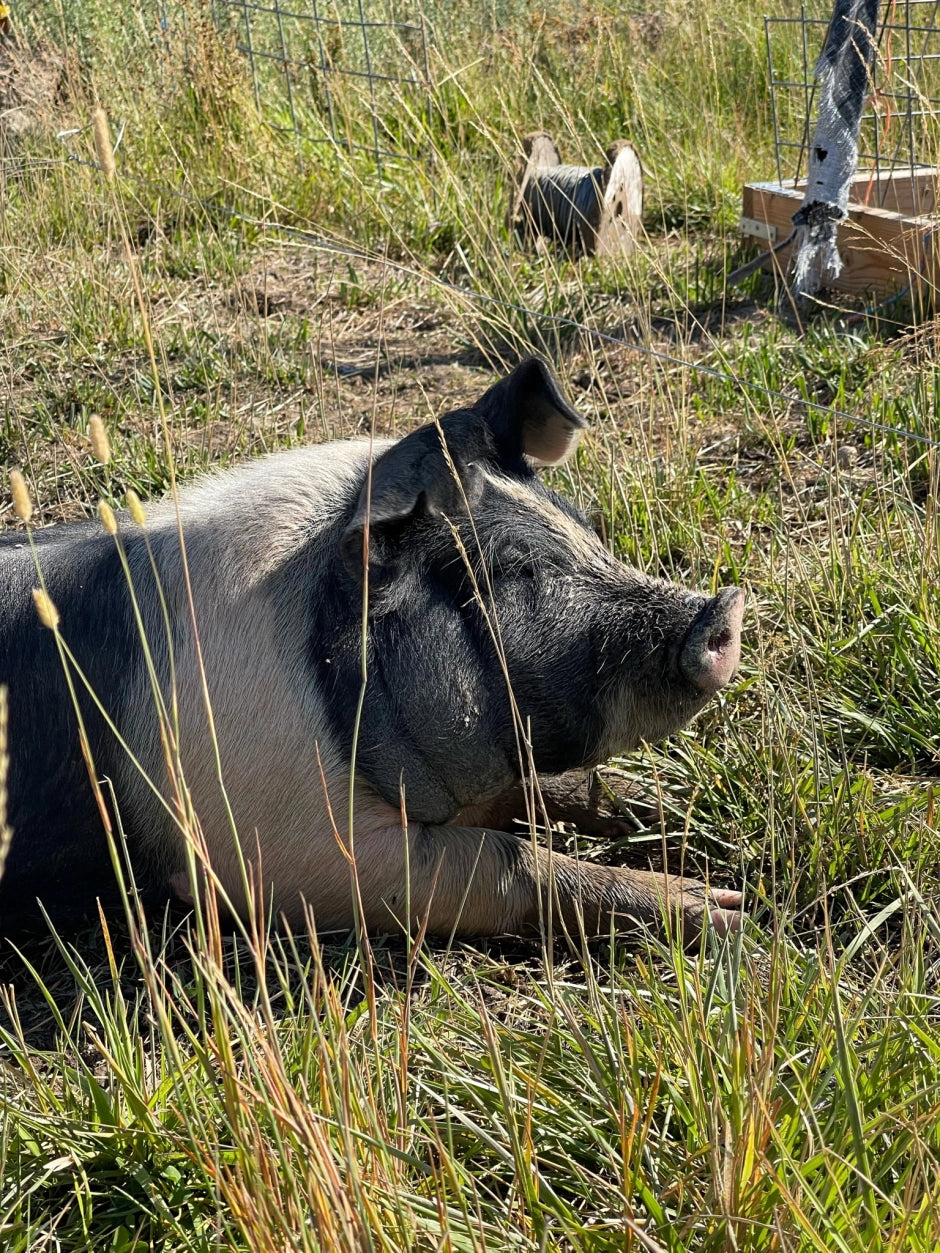What is your favorite way to enjoy pork? Savory or kind of sweet? Delicious pork roast and potatoes? Honey-glazed ham? Barbeque ribs? (Is your mouth watering yet?)

Our current family favorite is smoked and pulled fresh ham roast.
As your farmer, we want to be as transparent as possible about the way we raise your pork.
There are many ways to put bacon in your freezer, and instead of focusing on how other facilities choose to feed and care for their pigs, I’ll just tell you all about our operation.
Our pigs are put out to pasture where they can live their best piggie life and do all the piggie things. They can root, graze and wander. Besides tasting really good, pigs contribute to the farm because they are natural tillers. They stir up the soil microbiome and awaken (or activate) old seed banks and grasses.

Pigs raised in the sun on pasture are higher in vitamin D and Omega 3s. They have a higher and better nutritional profile because they’re out in the sun, pasture, and even because of the little bugs they eat.
They are rotated to fresh pasture every 3-7 days. We give them a little more time because we want a deeper disturbance on the ground. They have lots of fresh space and they aren’t living in their poo (like you might imagine pigs do).
[Red Wattles are great grazers and consume a little less grain supplement than other breeds.]
Pigs are OMNIVORES, so their digestive systems can handle grains, unlike ruminant animals that rely solely on fermentation.

Our pigs receive non-GMO grain supplements with essential minerals in their feed mix, and we are choosing soy-free and corn-free grain supplements from now on for a few reasons…
Corn is harder to digest (it comes out whole in their manure!) and soy causes reproductive issues along with increasing the amount of polyunsaturated fats stored in the animal’s fat. (Polyunsaturated fats are highly inflammatory and directly connected to other major health concerns).
Soy is a known endocrine disrupter, is estrogen-heavy, and affects hormonal balance (in animals and humans) resulting in a myriad of issues.
Isoflavones of soy proteins are still detectable in the animal’s meat. Those who have soy and even peanut sensitivities or allergies can be sensitive enough to meat with soy in it and we want to avoid that.
We have also started fermenting all of the feed for our omnivores (pigs, chickens, turkeys…). Fermenting their feed increases digestibility and certain nutrition factors. The microbial environment of fermented feed strengthens the health and immune system of the animals.
Just as with our beef, we focus on natural sources to keep the balance in the bodies of our pork. We don’t vaccinate, use synthetic dewormers or antibiotics (but will if we absolutely have to – the animal’s health is our priority). Pasture management (including rotation, overall health, and cleanliness) is our strongest parasite program.
We put Apple Cider Vinegar in the pigs’ water, which promotes alkaline, balances the ph/acid in the body, and expells worms and parasites. Meat is even more tender in animals that consume ACV!
We process our pigs when they are around 8 months old, but more so it depends on their size. The highest quality meat is when they are between 250-300 lbs.
Starting this summer, we’re making our high-quality pork available to you in all the cuts… Hams, shoulder steaks, ribs, tenderloin, pork chops, roasts… you name it! We don’t usually cure our meat (to avoid nitrates) but might offer cured bacon… because hickory smoked bacon is one of life’s joys. (Visit our store to see what we have in stock).
We have worked hard to make our pork available to our friends all over the 48 states, and have worked out the details to ship our pork right to your door.
We have limited amounts of our quality, nutrition-packed pork, so be the first to know when it’s available by joining our email list and subscribing to our Neighborhood Newsletter!

